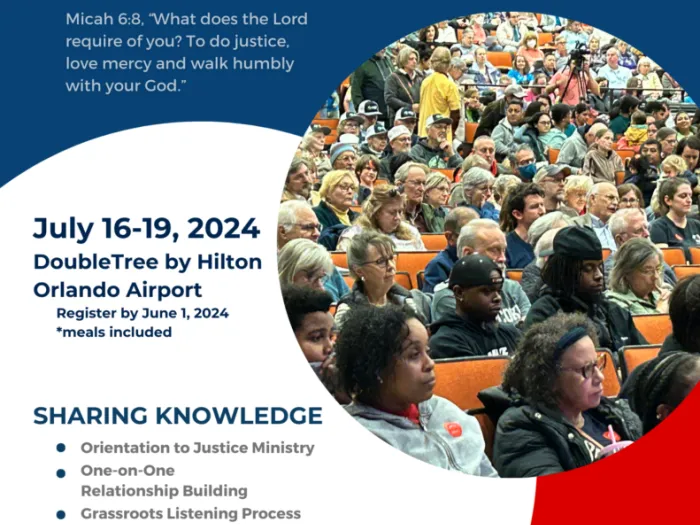Written by Courtney Forbes, member of First Presbyterian Church in Hammond, LA and chapter leader of Citizens Climate Lobby
As you may have read in this summer’s blog entry “Carbon Pricing 101”, this past July’s General Assembly of the PC(USA) voted with overwhelming (>80%) support for overtures 8-12 and 8-9, inviting you and all PC (USA) members to rally Congress to act on climate through putting a price on carbon emissions.
The overtures, now part of PC(USA) social witness policy, invite us to learn about Carbon Fee & Dividend as a way to address climate change. The G.A. actions also direct the Presbyterian Mission Agency staff in the Office of Public Witness and Presbyterian Hunger Program to interpret the new policies and to empower our advocacy.
One way Presbyterians can advocate for carbon pricing is through secular organizations such as Citizens’ Climate Lobby.
Recently in Congress, a real bill (HR 7173) was introduced that embodies the carbon dividend we’re all rooting for! Although not much is expected to happen in the fading light of 2018, you can expect this legislation to be reintroduced early in 2019 and then, we’re off to the races!
The PC(USA)'s Office of Public Witness in Washington, D.C. is expected to soon release a statement in support of this bill, and Presbyterians can be on the look-out for an action alert through our capwiz system, once the new Congress is in place to receive our best advocacy.
The Energy Innovation and Carbon Dividend act, which was introduced just after Thanksgiving, enjoys the sponsorship of six congressional representatives: three Republicans (Rep. Rooney, FL; Rep. Fitzpatrick, PA; Rep. Trott, MI) and three Democrats (Rep. Deutch, FL; Rep. Crist, FL; Rep. Delaney, MD).
The substance of the bill contains four key components. They are:
The fee: The Energy Innovation and Carbon Dividend Act will put a fee on all oil, gas and coal in the US in proportion to the volume of greenhouse gases they emit. Coal, the biggest polluter, is the most affected, natural gas the least. The fee starts at $15 per ton of CO2 and increases $10 per ton annually, enabling a stable transition with the transparency that industry needs. Under this plan, America’s emissions will decrease by 33% within 10 years.
The dividend: Money from the fee will be allocated equally and directly to American citizens as a monthly rebate beginning the month before the first fees are imposed. Most American households will have more money in their pocket to spend because their dividend will exceed increased costs related to fossil fuels. Lower- and middle-income families benefit the most relative to their expenditures while wealthy households benefit less as they typically consume a larger amount of fossil-derived energy. Of course, everyone benefits from a stable climate. An additional 2.1 million jobs will be created from the effect of the dividend on the economy. The public is predicted to spend the funds on basic needs, like health care.
The border adjustment: To protect US manufacturers and jobs, goods imported from countries that do not have an equivalent carbon price will pay a border carbon adjustment. This will encourage global adoption of similar legislation as every nation will wish to retain the revenue generated from such a fee within their own borders. Goods exported from the United States to countries without a carbon fee will receive a refund under this policy to keep our products competitive in the world market.
Regulatory adjustment: HR 7173 puts a moratorium on the regulation of emissions that are subject to the carbon fee, but only as it pertains to their greenhouse gas effects. If emission targets are not met after 10 years, then EPA regulatory authority over these GHG would be restored. Regulations on other pollutants will not be affected, nor will regulations such as auto mileage standards, water quality, and more. While this may seem to be contradictory to PC(USA) environmental policies that support a strong EPA, it is believed in this particular instance that carbon pricing itself will be the more effective way emissions get lowered in this economic and political time—and if needed, there is the clause that EPA regulation would be reinstated.
What are some differences between the Energy Innovation Act and the Carbon Fee & Dividend endorsed by G.A.? There is an exemption for agricultural fuel, a rebate for Carbon Capture and Storage, and a short list of other technical variances. Because industrial agriculture has a major role to play in consuming and creating greenhouse gases, we will be mindful of other policy advocacy necessary to be sure that all consuming and emitting sectors eventually all participate together to solve the climate crisis.
What You Can Do:
A monthly phone call to your members of Congress will have an outsized impact when we act in concert as members of a common faith. In these monthly phone calls, we can show appreciation for the work Congress does, express our concern for our climate, and make a request: please support the Energy Innovation and Carbon Dividend Act!
The GA’s call to action is for each of us to help all of our voices to be heard. Please bring this calling to your friends, justice ministry, your pastor, session, and presbytery! Overture 08-09 included some practical ideas for organized calls, letters, and other actions.
At home, strike up conversation about climate with your neighbor and friends. Use these talking points about climate change from Blessed Tomorrow for general conversations about climate change. Learn more about carbon pricing and this bill from Citizens Climate Lobby.
Don’t forget to enjoy and to advocate for the protection of the beautiful natural spaces we love—that’s part of climate action, too. Broader advocacy efforts and educational and worship resources on earth care are available through Creation Justice Ministries.
Relentless, respectful engagement, regardless of party or other concerns, builds bridges of trust. Our words, our voice, and the Word, are a gift from God and a force of Nature. Congress may seem like an immovable object – but we are an unstoppable force for Nature – for Creation. We know that we are good at persistent advocacy, and that’s just what Congress needs to have the will, from us, to act. As we, PC(USA)’s 9000+ congregations add our voice of support, Congress will lead on climate action.
You may freely reuse and distribute this article in its entirety for non-commercial purposes in any medium. Please include author attribution, photography credits, and a link to the original article. This work is licensed under a Creative Commons Attribution-NonCommercial-NoDeratives 4.0 International License.




